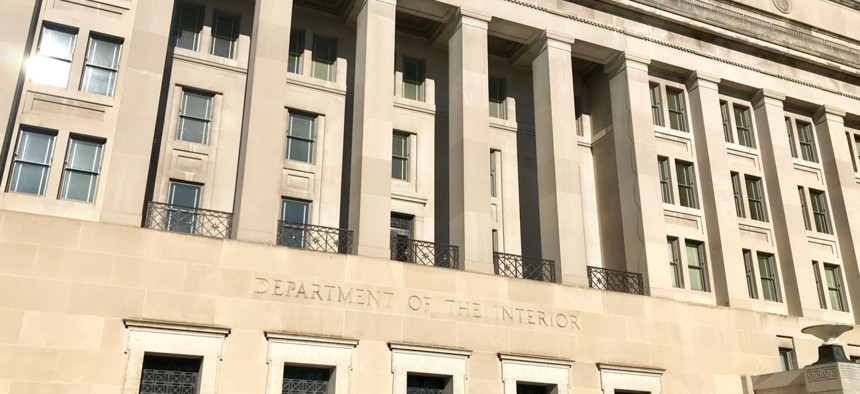
Jer123/Shutterstock.com
Viewpoint: Interior Secretary’s Move to ‘Enhance’ Ethics Could Legitimize Bad Behavior
Consolidating the department’s ethics programs in the Office of the Solicitor will benefit leadership, not the public.
A productive response to a steady stream of “lapses in ethical behavior” at the top levels of a federal department would be to address the underlying conditions that allowed those lapses to occur. An unproductive response might look something like shuffling agency ethics personnel around so they all report to an office whose mission is to protect the agency from legal liability. Guess which approach the Interior Department is taking?
Last month, Interior announced that it would reassign all full time employees working on ethics issues to the Office of the Solicitor, which already contains the director of the Ethics Office and some of its staff. Consolidation isn’t necessarily a bad idea. The department is composed of nine technical bureaus and four offices and, until now, each has had their own ethics officers that report to the head of the bureau. A department press release announcing the change characterized the current system as “13 disparate ethics programs with varying staffing and operations standards.” Interior Secretary David Bernhardt claimed that consolidation would be a step toward “enhancing the independence of ethics officials and the ethics program.” But while consolidating the department’s ethics program into a single office may improve consistency, it is unlikely to increase the program’s independence and effectiveness.
Independence is particularly unlikely because Bernhardt is consolidating all ethics personnel into the agency’s primary legal office, analogous to a general counsel.
The Project On Government Oversight has long argued that the public is not well served when transparency and accountability initiatives are located in an agency’s legal office. Those offices are unlikely to call attention to matters that may reflect poorly on the agency or its leadership. One recent example comes from the Environmental Protection Agency, where an independent review of then-Administrator Scott Pruitt’s excessive travel costs revealed that EPA’s Office of General Counsel issued an opinion in support of the agency’s process for approving first class air travel. The Inspector General disagreed and EPA eventually amended its process.
This disagreement about legal standards is understandable. A general counsel’s role is to protect the agency, and laws are often written in a way that allows for conflicting interpretations. However, the goal of the ethics program is to prevent conflicts of interest on the part of executive branch employees, including agency leaders. Ethics advice must be independent and based on the law, rules, and ethics pledges that abound.
It is inevitable that at some point, an ethics official acting in good faith will come to a different conclusion about what is required under the governing ethics laws than would an attorney serving as a zealous counsel to the head of an agency, which is the Solicitor’s role at Interior. Moving the ethics program to the agency’s legal office all but ensures that when such a conflict arises, it’s the agency lawyers that will have the final say over what the law requires, not the ethics professionals.
In light of that reality, the relationship muddies the reliability of ethics advice coming out of the agency’s ethics program. House Republicans on the Oversight and Reform Committee and the Natural Resources Committee released an interim report acknowledging that Interior Secretary Bernhardt received the green light from the agency’s ethics office to meet with both a company on his recusal list and an oil and gas trade group that is associated with an entity on his recusal list. While the agency ethics officials recommend one of the companies be excluded from the meeting, and it ultimately was, the fact remains that the meeting received a green light whether or not the conflicted company was present. It’s unclear why ethics officials would OK such a meeting that at best violates the spirit of the ethics restrictions on the secretary—if not the letter of the law—although it might have something to do with the fact that the decision came from officials already working out of the Solicitor’s office.
While the tension outlined above clearly isn’t new, consolidating every employee of the agency’s ethics program into the legal office will exacerbate it. (And Interior isn’t the only agency where the ethics program is run out of the legal office: The Defense and Homeland Security departments are two other notable examples.)
Ethics programs should be separate from an agency’s office of general counsel. Ethics officials need their own independent lawyers empowered to go toe to toe with the agency’s lawyers when necessary. Inspectors General were once subject to similar tensions, so Congress amended the law in 2008 to require Inspectors General to receive legal advice not from the general counsel of the agency they oversee but from independent legal counsel.
For the public to have any faith in the effectiveness of an agency’s ethics program, programs must be free from agency interference and operate independently to protect the public from the conflicts of interest that are seemingly routine now.
Liz Hempowicz is the Director of Public Policy at the Project On Government Oversight (POGO).
Image via Jer123/Shutterstock.com.
NEXT STORY: Play of the Day: The President's Busy Schedule






